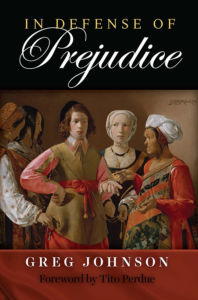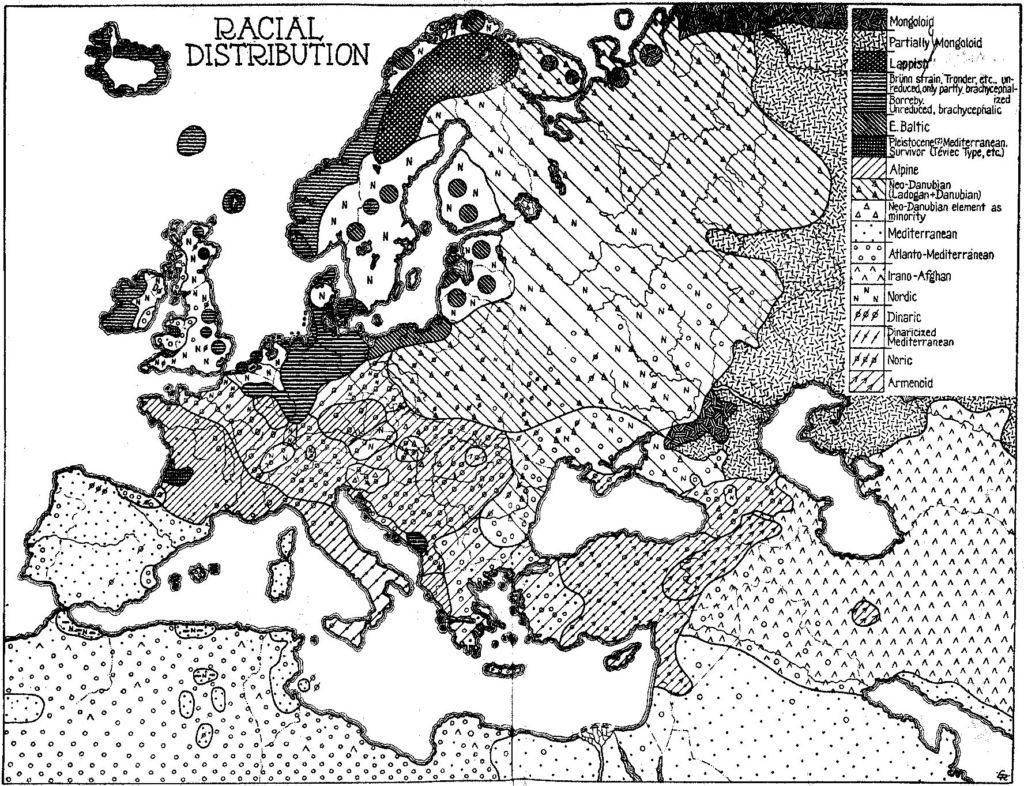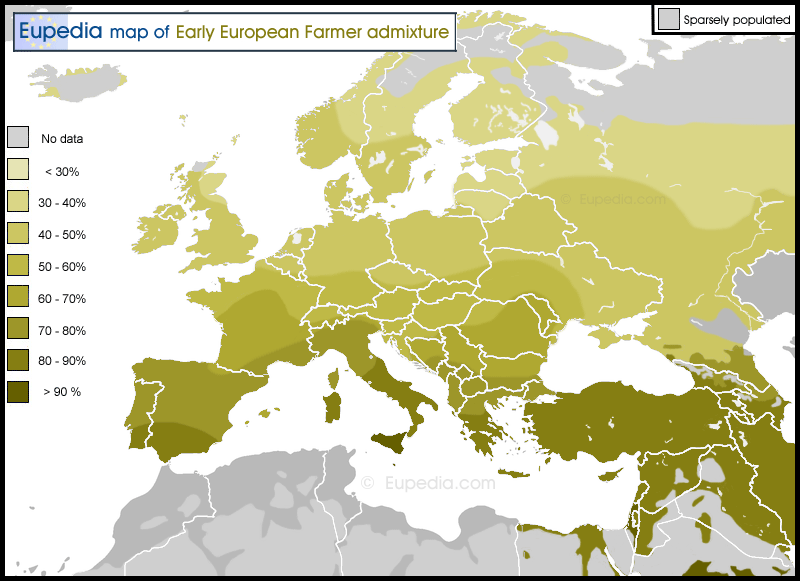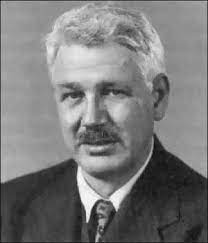Carleton S. Coon: Scientist & Reluctant White Advocate
Morris van de Camp3,027 words
Arabic version here
Carleton Stevens Coon (1904-1981) knew how to use his fists. As a boy, he knocked out the eye of another kid, who had been one of the first Irish Catholics to live in his town. He later laid an Albanian out flat while he was carrying out anthropological research in the Balkans. During the Second World War, he rushed to the aid of a French officer who was being attacked by a Corsican. On yet another occasion, while (probably) “well-lubricated,” he punched another man over their differing interpretations of the War of 1812. This fighting spirit no doubt helped Coon during his career in a very contentious field: the physical and cultural study of humanity.
Coon grew up in Wakefield, Massachusetts. His ancestry was mostly New England Yankee, but his patrilineal great-grandparents were Cornish. His grandfather, William Lewis Coon, was a non-commissioned officer in the Union Army and was on the March to the Sea with Sherman.
In his posthumously published memoirs, he wrote that the only social differences between groups that he had understood as a young kid were those between Catholics and Protestants. Ethnicity didn’t matter as much as religion. Those of French Canadian or Italian ancestry who attended the Congregationalist Church were on one side, while Catholics were on the other. He was not aware of anti-Semitism or any other sort of ethnonationalism then.
Coon was a decent student in his youth, but he broke his high school’s water pipe while goofing off and was expelled. He transferred to the Phillips Andover Academy. It was there he was able to learn Greek and further expand his knowledge of ancient Egypt. By the time he graduated from high school, he could read Egyptian hieroglyphics.
He attended Harvard University, learned Arabic, and graduated in 1925 — a year early. He immediately went on to graduate school. As part of his Ph.D. dissertation, he went to Morocco to study the Rif tribe. They are a race of blond Nordics who speak a Berber tongue. There were wars taking place in Morocco at the time, so he was embarking on a risky venture to get at the truth.
These are the places Coon’s visited on his travels, and when:
- Morocco, 1924-28, 1942-44, 1962
- Albania, 1929-30
- Russia, 1933, 1964
- Ethiopia, southern Arabian Peninsula, 1933-34
- Tunisia, Corsica, Bari, 1943-44
- Iraq-Iran, 1948-51
- Afghanistan, Australia, 1954
- Syrian desert, 1955
- Saudi Arabia, 1955
- East Africa, 1955
- East & south Asia, 1956-57
- Southeast Chile, 1958
- Sierra Leone, Ghana, Nigeria, 1965
- Chad, Cameroon, Tibesti, Acacus, Libya, 1965-66
By the 1950s, Coon was the most influential anthropologist in America. He trained students who went on to become prominent scientists in their own right. One of his sons became the US Ambassador to Nepal, while his daughter-in-law was the US Ambassador to Bangladesh.

You can buy Greg Johnson’s White Identity Politics here.
Coon worked for the Office of Strategic Services during the Second World War and was eventually commissioned a major in the US Army. Coon’s actions were beyond valorous, and he was awarded the Legion of Merit. He was deployed to Morocco to organize the Rif tribe into a force to fight against the Vichy French and, if necessary, the Spanish during Operation Torch. While in Morocco, he came up with the idea of making landmines that looked like mule droppings. He also organized the defense of an important lighthouse in Morocco. After he deployed to Corsica at the head of an OSS team, his unit helped to take out a German 88mm gun position.
He is very frank about the relations between the supposed allies on both sides of the war. He describes seeing German fighter pilots mercilessly strafe a column of surrendering Italians. Later, the French army stole vehicles from the Americans in Corsica. The French likewise took a dim view of the OSS’ policy of training North Africans to destroy railways. In war, one’s most dangerous enemy is often one’s supposed ally.
While in the hospital recovering from a head injury after the war, his wife, Mary Goodale Coon, divorced him. They had two sons together. He then married Lisa Dougherty Geddes.
Coon’s best efforts were probably his archaeological digs in caves in North Africa and western Asia. He often found fossilized bones or knapped flint tools in them. In the same way that modern humans tinker with computer code or go about producing a higher grade of steel, cavemen improved their knapped stone tools. He demonstrated the ways in which early humans did this in his various publications.
Coon often appeared in a highbrow TV show during the 1950s called What in the World? Museum pieces would be shown and Coon and the other guests would be tasked to identify their origin. Coon usually knew their origins right away, but played things up for entertainment and learning value. He would then discuss the cultural influences as evinced in the carvings, type of wood, minerals, and so on.
Important Insights
All of Coon’s books sold well. When reading his autobiography, I was struck by how many of his ideas still influence the general scientific and social narrative today. Coon argued that man’s mastery of fire was the critical technological jump. He argues:
With the increase in energy consumption came improvements in transportation and communication, increasing specialization and growth in the size and complexity of human institution until the whole world is now on the verge of becoming a single super-institution.[1]
The world hasn’t yet become a “super-institution,” but the biggest man-made machine to date is the American power grid, and much international controversy and cooperation revolves around energy resources such as oil, coal, pipelines, and so on. The quest for more and cheaper energy has driven the economy for decades.
Coon also recognized that southern Arabia was highly unstable. This region was the problem of the future, he argued. He is most certainly correct on that count. He wrote about the people of Yemen being at odds with the royal Saudi family as far back as 1933. Osama bin Laden, although a Saudi citizen, was of Yemeni origins, for example. The British waged a war in Aden in the early 1960s, and the Egyptian army deployed to North Yemen at the same time. In the 1970s, North and South Yemen waged war against each other. Yemen united in 1990, but the problems continue. In recent years, the Saudis have been waging a vicious war against the Yemenis.
One thing I noticed in Coon’s autobiography is his reinforcement of the concept that to Americans, the rest of the world is small; but to the rest of the world, America looms large. In his travels, Coon runs into English-speaking locals everywhere. His Ethiopian and Somali guides lived in or went to school in the United States. Croatians he meets had worked in Ohio. In the Azores, many of the people spoke English with a Massachusetts accent, since the Portuguese there often had family members in New England who had married into old-stock Yankee families. In other countries, the most prominent people were Protestant American missionaries.
Caravans: The Story of the Middle East, published in 1951, is an outstanding cultural study. Coon argues that Middle Eastern civilization has roots in the Islamic “golden age” of the ninth century. All interactions with those nations need to take this into account.
The Berbers
The Berbers are an interesting people. Many of them are Nordic, but other than the invasion of the Vandals in the early fifth century, there is no historical record of a migration to North Africa from northern Europe. Madison Grant wrote:
. . . this blondness of the Berbers, though small in amount, is of Nordic origin we may safely assume, but through what channels it came we have no means of knowing. There is no historic invasion of North Africa by Nordics except the Vandal conquests but there seems to be little probability that this small Teutonic tribe left behind any physical trace in the native population.[2]
With the advent of DNA technology, it has become possible to speculate that the connection is through mtDNA Haplogroup V. This DNA signature is common among the Berbers of western North Africa and is evenly spread through Europe, with high concentrations in the northern Europe. We know that during the last Ice Age, humans lived in Iberia and North Africa and expanded northwards as the ice melted away. The Nordics could have evolved in the Atlas Mountains. This is all speculation, of course, but it is important to note that Coon did correctly read the data. The Rif people are racially like northern Europeans.
Data Visualization & the Races of Europe
By the middle 1960s, Coon had become something of an academic pariah due to a schism within the field of anthropology. Coon, a physical anthropologist was on one side. He would go into the field, physically measure the people he saw there, and then draw conclusions. On the other side were the “cultural” anthropologists. They were organized by Franz Boas, a Jewish activist. Boas initially published findings about race and IQ that matched what white advocates understand and discuss today, but Boas obscured that truth in favor of ideological activism in the early twentieth century. Stephen Jay Gould and Margaret Mead, disciples of Boas, falsified their data to draw conclusions which matched liberal, pro-“civil rights,” and pro-Jewish biases.
This was likely a result of William Z. Ripley’s 1899 book The Races of Europe. Ripley, a Yankee, took the data about skull measurements, skin tone, and eye and hair color and then applied it to a map of Europe. The visualized data showed that Europe had three races. In the north were fair-eyed and fair-skinned people with long skulls. They came to be called Nordics. In Europe’s mountainous center were round-skulled people of medium stature. They came to be called Alpines. In southern Europe and North Africa were people otherwise like the Nordics, but darker. They came to be called the Mediterraneans.
After Ripley published his findings, events in European history started to take on a new meaning. The Germanic victory over the Romans at the Teutoburg Forest in 9 AD could be explained in part by a Germanic racial heartiness that Rome’s other enemies didn’t have. The Völkerwanderung, or migrations, of the northern Europeans eventually destroyed the Western Roman Empire and gave rise to Spain, Portugal, Lombardy, and other regions, and corresponded to the pattern set at Teutoburg.

You can buy Greg Johnson’s In Defense of Prejudice here
The Viking Age fit in with this racial interpretation as well. England became a well-governed land after the Norman invasion. The Normans were descended from Vikings. Russia, too, took shape due to Scandinavian settlement. Lothrop Stoddard wrote:
The legend of the founding of Kiev is quaintly significant. The story goes that the local tribes were so afflicted by domestic feuds and raids by their neighbors that they invited a famous Viking chief to be their ruler. Their invitation is said to have run as follows: “Our land is great and has everything in abundance, but it lacks order and justice. Come take possession and rule over us.” Whether or not the legend states the exact facts of the case, certain is it that about a thousand years ago a Norse chief named Rurik did become ruler of Kiev and built up a state which soon became powerful and which had the foundations of Russian nationality and civilization.[3]
Ripley gave a presentation of his findings to an organization called the Half Moon Club in 1908, an organization of upper-class New Yorkers. It was headed by Madison Grant. After that presentation, Madison Grant became a Nordic activist. Grant’s efforts produced America’s greatest immigration law, the Johnson-Reed Act. This law effectively ended immigration from those areas of Europe that had produced so many troublemakers. The main target of the restrictions wasn’t the Mediterraneans; Greece, Rome, Spain, and Portugal all have accomplished civilizations. The target was rather the Alpines, especially Eastern European Jews. After the act passed, American domestic politics stabilized for decades and America became a great power.
Coon updated The Races of Europe in 1939. He divides the three races identified by Ripley into sub-races. This was partially due to the difficulty of quantifying the Alpine race. Coon recounts that Franz Boas was given a copy of the 1939 edition of The Races of Europe to review, but did not do so and did not recommend it to anyone else for review, either. Boas wanted to discourage any publicity for it.

Coon divided Europe’s races into smaller, more precise groupings. Notice the identification of Nordics among the people of the Maghreb.
Coon & the “Civil Rights” Mob
While you might not be interested in the Racial Holy War, the Racial Holy War is interested in you. As a preeminent anthropologist, Coon was drawn into the “civil rights” debate, however reluctantly.
One evening in May 1962, while he was serving as the President of the American Association of Physical Anthropologists, a coalition of anthropologists attempted to compel him to reject the book Race and Reason: A Yankee View by Carleton Putnam.
In his account of the event, Coon says none save one of the “rejecters” had actually read Race and Reason. Coon decided to resign rather than support the book’s condemnation. He went on to write two further books, The Origin of the Races (1962) and The Living Races of Man (1965). His ideas were savagely critiqued by Ashley Montagu (whose birth name was Israel Ehrenberg). Montagu was a Jewish activist who used anthropology to further the aims of the organized Jewish community.
His other rival was Theodosius Dobzhansky. Dobzhansky did some anthropology, but most of his work pertained to the evolution of fruit flies. It is likely that Dobzhansky was seeking to gain fame by attacking Coon at a time when “civil rights” was extremely fashionable.
Wilmot Robertson wrote the best summation of the controversy:
Coon provided powerful ammunition for the anti-equalitarian or hereditarian school with a startling and illuminating theory on the origin of races. For thousands of years it had been taken for granted that the races of man had descended or branched out from a single species. In direct and iconoclastic contradiction to this traditional doctrine, Coon stated that the five living races of mankind, which he named Caucasoid, Mongoloid, Australoid, Capoid and Congoid, had evolved separately into Homo sapiens following different timetables. If Coon was right about the parallel genesis of races, there now existed an evolutionary basis for racial differences, and the case against the equalitarians was strengthened. Even more damaging to the equalitarian viewpoint was Coon’s assertion that the Negro race, which he assigned to the Congoid group, was the last of the major races to evolve. The blacks, according to Coon, had been in a sapiens state for a shorter time than the white and yellow races (40,000 versus 210,000 years). This led inexorably to the conclusion that blacks were the least developed and least articulated of mankind’s principal racial divisions.[4]
Settled Science?
There is no such thing as settled science. When looking at race scientifically, the large races of man, the Caucasians and the Congoids for example, are easy to identify. Identifying groups within the races depends on how one arranges the data. When looking at Haplotype R1, it appears as though there is an Indo-European race that stretches from Europe to India with a linguistic division called “centum and satem” that corresponds roughly to the differences between R1b and R1a across Eurasia. But the Y chromosomal marker is only part of the story. In interpreting DNA differences between clusters called European Hunter Gathers and Early Farmers, one sees some truth in the Nordic and Mediterranean racial groupings.

The Mediterranean race corresponds to the Early Farmer DNA. Ultimately, racial science gets the big picture right, but the details depend on how one organizes the data.
Evidence has come to light in recent years that Europeans, North Africans, and Middle Eastern People have Neanderthal DNA that doesn’t exist south of the Sahara. In Asia there are DNA markers for Denisovan man that doesn’t exist in modern populations elsewhere. One can therefore conclude that Coon was on the right track when he argued that the races diverged earlier than supposed by “civil rights”-supporting scientists.
Epilogue
Carleton Coon was a reluctant white advocate, if one could even call him that. What he did was to proclaim the facts as he saw them. That ultimately put him in conflict with the liars who push the “civil rights” narrative. The story of Coon’s career also falls into the conflict between Yankees and Jews, and matches those of other ethnonationalist advocates; i.e. he was successful in other areas of his life. It is often the case that the most ethnically aware are also high-class people and not the other way around.
It is unquestionable that sub-Saharans have not risen to the civilizational level of whites since the “civil rights” movement won its social victory. Everywhere the Congoid goes, ruin follows. Today, “civil rights” supporters can call up mobs that destroy statues, remove plaques, and burn small businesses — but in the 1950s and ‘60s, “civil rights” supporters had a sense of hopeful purpose. The 2020 rioting was destruction carried out by panicked elites.
Coon’s detractors call his work pseudo-science. This is calumny and simply not true. Coon used the scientific method. His research is carefully documented, and all of his experiments are repeatable by others. One can take Coon’s carefully-photographed specimens from The Races of Europe and improve upon his data by analyzing them in the light of modern DNA technology and modern genealogical databases.
There is no way to know what Coon would have thought of today’s Middle Eastern policy failures, the Israel lobby, or Antifa/BLM terrorism, but it is certain that if America had followed the logic of his life’s work, we wouldn’t be in such a mess.
* * *
Counter-Currents has extended special privileges to those who donate $120 or more per year.
- First, donor comments will appear immediately instead of waiting in a moderation queue. (People who abuse this privilege will lose it.)
- Second, donors will have immediate access to all Counter-Currents posts. Non-donors will find that one post a day, five posts a week will be behind a “paywall” and will be available to the general public after 30 days.
To get full access to all content behind the paywall, sign up here:
Paywall Gift Subscriptions
 If you are already behind the paywall and want to share the benefits, Counter-Currents also offers paywall gift subscriptions. We need just five things from you:
If you are already behind the paywall and want to share the benefits, Counter-Currents also offers paywall gift subscriptions. We need just five things from you:
- your payment
- the recipient’s name
- the recipient’s email address
- your name
- your email address
To register, just fill out this form and we will walk you through the payment and registration process. There are a number of different payment options.
Notes
[1] Carleton S. Coon, Adventures and Discoveries: The Autobiography of Carleton S. Coon (Englewood Cliffs, N.J.: Prentice-Hall, 1981) p. 230.
[2] Madison Grant, The Passing of the Great Race: or the Racial Basis of European History (New York: Charles Scribner’s Sons, 1918), p. 223.
[3] Lothrop T. Stoddard, Racial Realities in Europe (New York: Charles Scribner’s Sons, 1924), p. 193.
[4] Wilmot Robertson, The Dispossessed Majority (Cape Canaveral: Howard Allen Enterprises, 1981), pp. 18-19.
Carleton%20S.%20Coon%3A%20Scientist%20and%23038%3B%20Reluctant%20White%20Advocate
Enjoyed this article?
Be the first to leave a tip in the jar!
Related
-
Crusading for Christ and Country: The Life and Work of Lieutenant Colonel “Jack” Mohr
-
Nowej Prawicy przeciw Starej Prawicy: Wprowadzenie
-
Notes on Plato’s Alcibiades I Part 2
-
Stalin’s Affirmative Action Policy
-
Notes on Plato’s Alcibiades I Part 1
-
Introduction to Mihai Eminescu’s Old Icons, New Icons
-
Counter-Currents Radio Podcast No. 582: When Did You First Notice the Problems of Multiculturalism?
-
Sperging the Second World War: A Response to Travis LeBlanc




3 comments
“In Europe’s mountainous center were round-skulled people of medium stature. They came to be called Alpines. … The Johnson-Reed Act … effectively ended immigration from those areas of Europe that had produced so many troublemakers. The main target of the restrictions wasn’t the Mediterraneans; Greece, Rome, Spain, and Portugal all have accomplished civilizations. The target was rather the Alpines, especially Eastern European Jews.”
Sounds like the act was targeted at “troublemakers” like A. Hitler. Perhaps that explains his dislike of the USA. It would be fun to create one of those “Hitler Rants” videos along those lines: “The let in those wops Sacco and Vanzetti, what did they ever “accomplish”? They filled their country with Africans so they could jitterbug all night, but they exclude me! Me! Me!”
The Act would also put the kibosh on the premise of Spinrad’s “The Iron Dream,” where Hitler immigrates to the US in the 20s and becomes a famous sci-fi illustrator.
On the other hand, Hitler was under no illusions about the “accomplishments” of the ancient Alpine peoples; according to Speer, Himmler’s Indiana Jones act infuriated the Fuhrer:
“Himmler is starting to dig up these villages of mud huts and enthusing over every potsherd and stone ax he finds. All we prove by that is that we were still throwing stone hatchets and crouching around open fires when Greece and Rome had already reached the highest stage of culture.”
Good presentation there.
Anyway, I suspect that the Alpines might have greater than average descent from the Caucasus Hunter-Gatherers.
Interesting details about Coon’s life, including about him getting in fights. I always supposed him to be a mild-mannered professor type.
I was reading the Races of Europe a few months ago. He goes through the different groups that lived in Egypt. First there were robust, rugged hunter gatherers, followed by people resembling the Early European Farmers, who raised pigs just like they did, culminating with people who resemble the modern, more semitic-looking people there now, from the first Kingdom up through the present. I’d like to see a genetic analysis of the former farmer inhabitants of Egypt. I wonder if they were Early European Farmers.
Coon’s research was fruitful. He described the skulls of corded ware as being a mix between modern-day blond Nordics and Iranians. Genetically, the Western Steppe herder ancestors of the corded people cluster between Northern Europeans and Central Asians on a principle component analysis map (though closer to the Europeans). It’s impressive that Coon spotted the similarity in skulls before genetic analysis was available.
https://www.researchgate.net/figure/Genetic-structure-of-ancient-Europe-a-Principal-component-analysis-Ancient-data-from_fig5_284019945
North Africans are not white. Okay, maybe some are blond, but most look middle eastern. Genetically none are white. You’d probably have to go back far to find common ancestors with those of whites.
More interesting is that at one time Caucasians or admixed people descended from them lived in the Sahara. The Earth’s slow orbital ‘wobble’ transformed today’s Sahara desert to a land covered with vegetation and lakes from about 11,000 to 5,000. I’m curious to see DNA from any human remains dated from that time period. Some sub-saharan Africans have R1b, specifically the V-88 branch, which diverged around 9,500-5,600, perfect timing for them to migrate to the Sahara when it was a grassland. R1b, as you know, is the Aryan haplotype. Of course, the associated whiteness is fully diluted among the negroes who have V-88 today, the y haplotype being only a meaningless vestige, spread so far as to be paired with no associated autosomal DNA and thus have no bearing on phenotype, but it’s evidence Caucasoids got pretty far into Africa in the neolithic.
https://www.nature.com/articles/ejhg2009231
Anyway, your article about Coon is interesting.
Comments are closed.
If you have Paywall access,
simply login first to see your comment auto-approved.
Note on comments privacy & moderation
Your email is never published nor shared.
Comments are moderated. If you don't see your comment, please be patient. If approved, it will appear here soon. Do not post your comment a second time.